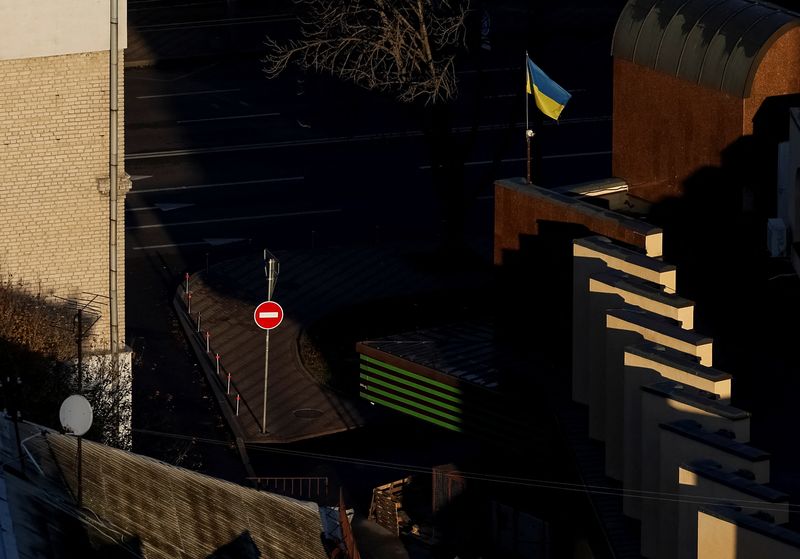Ukraine, marking 1,000 days of Russian invasion, eyes end to war next year

By Tom Balmforth
KYIV (Reuters) – Ukraine marked 1,000 days on Tuesday since Russia’s full-scale invasion, with weary troops battling on numerous fronts, Kyiv besieged by frequent drone and missile strikes, and officials preparing for Donald Trump to reclaim the White House in January.
In a boost for the beleaguered country, U.S. President Joe Biden gave the green light for U.S. missiles to be used against targets deeper inside Russia, potentially limiting its options to launch attacks and supply the front.
But the dramatic shift in policy may be reversed when Trump returns to the White House in January, and military experts cautioned that it would not be enough on its own to change the course of the 33-month-old war.
Thousands of Ukrainian citizens have died, over 6 million live as refugees abroad and the population has fallen by a quarter since Kremlin leader Vladimir Putin ordered the invasion by land, sea and air that began Europe’s biggest conflict since World War Two.
Military losses have been catastrophic, although they remain closely guarded secrets. Public Western estimates based on intelligence reports vary widely, but most say hundreds of thousands have been killed or wounded on each side.
Tragedy has touched families in every corner of Ukraine, where military funerals are commonplace in major cities and far-flung villages, and people are exhausted by sleepless nights of air raid sirens and anguish.
Now the return of Trump, who has vowed to end the fighting quickly – without saying how – calls into question the future of U.S. military aid and the united Western front against Putin, and raises the prospect of talks to end the war.
PROSPECT OF TALKS PROMPTS ESCALATION
With Ukraine entering uncharted territory, a sense of escalation has been palpable as Moscow and Kyiv push to improve their battlefield positions ahead of any negotiations.
Already boosted by Iranian attack drones and North Korean artillery shells and ballistic missiles, Russia has now deployed 11,000 North Korean troops, some of whom Kyiv says have clashed with Ukrainian forces who have seized a part of Russia’s Kursk region.
One senior Kyiv official said Pyongyang had the capacity to send 100,000 soldiers.
Ukraine meanwhile has some of its best troops trying to hold that small piece of Russian territory, captured in August as a bargaining chip.
Kyiv says Russia has massed 50,000 troops there, while the Kremlin’s forces have also been making their quickest gains in the east of Ukraine since 2022 – and stepping up pressure in the northeast and southeast too.
With winter setting in, Moscow on Sunday renewed its aerial assault on Ukraine’s struggling power system, firing 120 missiles and 90 drones in the biggest aerial barrage since August.
In addition to the U.S. authorisation to strike military targets inside Russia with American-supplied weapons, external financial and arms aid also remain vital.
Despite two consecutive years of moderate growth, the Ukrainian economy is still only 78% of the size it was before the invasion, which saw GDP contract by a third in 2022. Ukraine’s once-giant steel and grain industries have been hammered.
RUSSIA DEMANDS UKRAINE GIVE UP TERRITORY AND NATO AMBITION
The U.N. Human Rights Monitoring Mission has verified the deaths of 11,743 Ukrainian civilians, though some Kyiv officials believe the number is much higher.
President Volodymyr Zelenskiy said last week that Ukraine must do its best to end the war next year through diplomatic means. But he has emphatically shut down any talk of a ceasefire before proper security guarantees are provided to Ukraine.
The Kremlin has said its war objectives remain unchanged since Putin said in June that Ukraine must drop its ambitions to join NATO, and must retreat from four Ukrainian regions that his forces partially control, all tantamount to capitulation for Kyiv.
A sea of small Ukrainian flags honouring the dead now occupies a corner of Kyiv’s Independence Square, once the beating heart of the mass pro-European protests that toppled Ukraine’s then Moscow-backed president in 2014.
Russia responded to the protests by seizing Ukraine’s Black Sea peninsula, Crimea, and backing a paramilitary insurgency in the east that killed 14,000 people before two series of talks, in the so-called Minsk format, halted the fighting with Kyiv.
After German Chancellor Olaf Scholz called Putin on Friday for the first time in nearly two years, Zelenskiy said the move reduced the Russian leader’s isolation. He also spoke out against the idea of renewed Minsk-style talks.
“We want to warn everyone: there will be no ‘Minsk 3’; what we need is real peace,” he said.
(Reporting by Tom Balmforth; editing by Mike Collett-White and Kevin Liffey)